This article was co-authored by Lydia Shedlofsky, DO. Dr. Lydia Shedlofsky is a Resident Dermatologist who joined Affiliated Dermatology in July of 2019 after completing a traditional rotating internship at Larkin Community Hospital in Miami, Florida. She earned a Bachelor of Science in Biology at Guilford College in Greensboro, North Carolina. After graduation, she moved to Beira, Mozambique, and worked as a research assistant and intern at a free clinic. She completed a Post-Baccalaureate program and subsequently earned a Master's Degree in Medical Education and a Doctorate of Osteopathic Medicine (DO) from the Lake Erie College of Osteopathic Medicine.
There are 9 references cited in this article, which can be found at the bottom of the page.
wikiHow marks an article as reader-approved once it receives enough positive feedback. In this case, several readers have written to tell us that this article was helpful to them, earning it our reader-approved status.
This article has been viewed 654,833 times.
Boils (medically referred to as furuncles) are painful, pus-filled red bumps that develop under the skin when bacteria infect and inflame one or more hair follicles or oil glands.[1] Boils are relatively common and typically caused by Staphylococcus aureus bacteria. Home care for boils should not normally involve popping or squeezing them because there's risk of spreading the infection, especially with those who have relatively weak immune systems (young kids, diabetics, the elderly). See your doctor about lancing a boil if your home remedies are ineffective.
Steps
Treating Boils at Home
-
1Wait and see. Most people's natural immune systems are strong enough to effectively deal with minor skin infections such as boils. Thus, boils often heal on their own after a period of a few weeks, although you'll likely experience some itching and mild throbbing pain in the early stages.[2] Boils can become more painful with time as the pressure builds up from pus accumulation, although they can spontaneously burst after a few weeks and then clear up quickly.
- If you are anticipating a boil bursting on its own after a few weeks, be prepared by carrying some antibiotic wipes and clean tissues with you or in your car.
- If you have a boil on your face, keep it clean and refrain from covering it up with a thick layer of make-up or cover-up. Facial boils can be embarrassing, but it’s best to expose them to the air and let your immune system deal with them.
-
2Apply a warm compress.[3] Applying a warm washcloth or flannel compress to your boil helps to rupture and drain it because the heat expands the blood vessels underneath the skin and increases blood and lymph flow. The warmth may also help soothe the pain, even though it’s promoting local inflammation. Soak a clean washcloth in water and put it in the microwave for between 30-45 seconds. Apply the warm compress to the affected area several times daily (for about 20 minutes at a time) until the boil starts to naturally drain and shrink.
- Be sure to wash and rinse the towel once you are done to avoid spreading the infection, although microwaving it will likely kill any bacteria anyway.
- Make sure the cloth from the microwave doesn't scald your skin and make the problem worse.
Advertisement -
3Consider using tea tree oil. Tea tree oil is a natural antibiotic/antiseptic commonly used to treat skin infections — it's extracted from the leaves of the Australian tea tree.[4] Tea tree oil may help get rid of boils because it has anti-inflammatory and antibacterial properties, although the degree to which it can absorb deep into the skin is not well understood.[5] It's also useful for preventing the spread of the bacteria once the boil has burst. Use a clean swab, dip it into the tea tree oil and then lightly dab your boil three to five times daily. Keep it away from your eyes as it might sting.
- Tea tree oil can trigger allergic reactions in some people (it's rare), so stop applying it if you notice the skin around the boil is getting irritated and puffy.
- Other natural antibiotics that have similar effects to tea tree oil include olive leaf extract, oregano oil, lavender, hydrogen peroxide, white vinegar, and iodine solution.
-
4Promote boil drainage. Once the boil bursts on its own, promote drainage by lightly putting some pressure on the edges with clean absorbent tissues. Don't be surprised if you see quite a bit of pus and blood come out of a boil — it's typically much more compared to a large pimple. Soak as much of the blood and pus up as possible, dispose of the tissue, then thoroughly clean the area with antibiotic wipes. Boils aren't contagious, but the bacteria within them can be.
- The boil may continue to "weep" (slowly drain) for a few hours, so consider dabbing it with some antibiotic cream or lotion and then covering it with a small bandage overnight.
- As best as you can, make sure the boil stays clean, dry, and covered the few weeks after it has drained.[6]
- Keep applying warm compresses for a few days after the boil has opened to help drain it as much as possible. Remember to always use clean compresses.
Seeking Medical Treatment
-
1Know when to call your doctor. Most boils are caused by ingrown hairs or by splinters or debris getting lodged in the skin.[7] In otherwise healthy people with strong immune systems, the boils get resolved and fade away within a few weeks. However, if your boil persists for more than a few weeks (or is chronically occurring) and involves severe pain, swollen lymph nodes, fevers/chills and/or loss of appetite, then call your family doctor and have it examined. Large boils (greater than 2 inches in diameter) should also be looked at by your doctor.
- Boils are not considered very serious, but other more serious conditions that can look similar include skin cancer, allergic reactions, wasp or bee stings, diabetic abscess, MRSA, herpes outbreak, and chickenpox.
- Applying antibiotic cream (Neosporin, Bacitracin, Polysporin) on boils often is ineffective because it doesn't penetrate deep enough into the skin to reach the bacteria.[8]
-
2Ask your doctor about lancing.[9] If your doctor confirms the skin lesion is a boil and not something more serious, then he/she might recommend lancing it if you've been dealing with it for more than a few weeks, or if it's particularly large or painful. Lancing is a minor in-office procedure in which the doctor applies a local anesthetic and then makes a small incision into the tip of the boil to release the pus and promote drainage.[10] The doctor will then bandage it up and send you home with basic cleaning instructions. Lancing by your doctor is always a much safer alternative to popping the boil at home yourself.
- In some cases, large, deep skin infections that can't be completely drained by lancing may be packed with sterile gauze to help soak up additional pus.
- Depending on the size of the boil, lancing it may leave a small scar on your skin. This may be a concern if the boil is on your face, so weigh your options with your doctor carefully.
-
3Take antibiotics only if strongly recommended. Antibiotic medications are seldom needed to deal with boils, although your doctor may prescribe them if the infection is severe enough or reoccurring.[11] For people with multiple or recurrent boils, antibiotics are usually prescribed by mouth for 10 or 14 days.[12] In particularly severe cases, two different antibiotics may be prescribed, plus the use of strong antibiotic ointments to be applied to the skin throughout the day.
- Overuse of antibiotics during the last few decades has created many resistant bacterial strains that can be life-threatening. If you develop a boil or other type of infection while in the hospital for a different ailment, then tell your caregivers immediately.
- Side effect of antibiotics include destruction of "friendly" bacteria in your intestines, which can lead to poor digestion, diarrhea, abdominal cramps and nausea.[13] Allergic reactions, rashes, and breathing difficulty are also relatively common with antibiotic use.
Expert Q&A
Did you know you can get expert answers for this article?
Unlock expert answers by supporting wikiHow
-
QuestionCan you pop a boil at home?
 Lydia Shedlofsky, DODr. Lydia Shedlofsky is a Resident Dermatologist who joined Affiliated Dermatology in July of 2019 after completing a traditional rotating internship at Larkin Community Hospital in Miami, Florida. She earned a Bachelor of Science in Biology at Guilford College in Greensboro, North Carolina. After graduation, she moved to Beira, Mozambique, and worked as a research assistant and intern at a free clinic. She completed a Post-Baccalaureate program and subsequently earned a Master's Degree in Medical Education and a Doctorate of Osteopathic Medicine (DO) from the Lake Erie College of Osteopathic Medicine.
Lydia Shedlofsky, DODr. Lydia Shedlofsky is a Resident Dermatologist who joined Affiliated Dermatology in July of 2019 after completing a traditional rotating internship at Larkin Community Hospital in Miami, Florida. She earned a Bachelor of Science in Biology at Guilford College in Greensboro, North Carolina. After graduation, she moved to Beira, Mozambique, and worked as a research assistant and intern at a free clinic. She completed a Post-Baccalaureate program and subsequently earned a Master's Degree in Medical Education and a Doctorate of Osteopathic Medicine (DO) from the Lake Erie College of Osteopathic Medicine.
Dermatologist There is no way to safely “pop” a boil at home. Warm compresses and over-the-counter medications for pain relief are often useful. Certainly, some boils do not remit with these basic instructions, and in these cases, a doctor visit is likely needed. Sometimes, a doctor will opt to professionally drain a boil and/or prescribe an antibiotic.
There is no way to safely “pop” a boil at home. Warm compresses and over-the-counter medications for pain relief are often useful. Certainly, some boils do not remit with these basic instructions, and in these cases, a doctor visit is likely needed. Sometimes, a doctor will opt to professionally drain a boil and/or prescribe an antibiotic. -
QuestionIs it safe to use a heating pad on a boil before it pops?
 Chris M. Matsko, MDDr. Chris M. Matsko is a retired physician based in Pittsburgh, Pennsylvania. With over 25 years of medical research experience, Dr. Matsko was awarded the Pittsburgh Cornell University Leadership Award for Excellence. He holds a BS in Nutritional Science from Cornell University and an MD from the Temple University School of Medicine in 2007. Dr. Matsko earned a Research Writing Certification from the American Medical Writers Association (AMWA) in 2016 and a Medical Writing & Editing Certification from the University of Chicago in 2017.
Chris M. Matsko, MDDr. Chris M. Matsko is a retired physician based in Pittsburgh, Pennsylvania. With over 25 years of medical research experience, Dr. Matsko was awarded the Pittsburgh Cornell University Leadership Award for Excellence. He holds a BS in Nutritional Science from Cornell University and an MD from the Temple University School of Medicine in 2007. Dr. Matsko earned a Research Writing Certification from the American Medical Writers Association (AMWA) in 2016 and a Medical Writing & Editing Certification from the University of Chicago in 2017.
Family Medicine Physician
-
QuestionWhat if the contents of the boil is hard?
 Chris M. Matsko, MDDr. Chris M. Matsko is a retired physician based in Pittsburgh, Pennsylvania. With over 25 years of medical research experience, Dr. Matsko was awarded the Pittsburgh Cornell University Leadership Award for Excellence. He holds a BS in Nutritional Science from Cornell University and an MD from the Temple University School of Medicine in 2007. Dr. Matsko earned a Research Writing Certification from the American Medical Writers Association (AMWA) in 2016 and a Medical Writing & Editing Certification from the University of Chicago in 2017.
Chris M. Matsko, MDDr. Chris M. Matsko is a retired physician based in Pittsburgh, Pennsylvania. With over 25 years of medical research experience, Dr. Matsko was awarded the Pittsburgh Cornell University Leadership Award for Excellence. He holds a BS in Nutritional Science from Cornell University and an MD from the Temple University School of Medicine in 2007. Dr. Matsko earned a Research Writing Certification from the American Medical Writers Association (AMWA) in 2016 and a Medical Writing & Editing Certification from the University of Chicago in 2017.
Family Medicine Physician
Warnings
- If you have an immune system disorder, heart murmur, diabetes, or are using drugs that suppress the immune system (like corticosteroids), then you should always seek medical attention for a boil as soon as you can.⧼thumbs_response⧽
- Call your family physician or dermatologist if a boil gets extremely painful, lasts longer than a few weeks, or occurs with a fever.⧼thumbs_response⧽
- Do not squeeze or pop a boil yourself (particularly if you're untrained), as this can irritate and spread the infection.⧼thumbs_response⧽
References
- ↑ http://www.mayoclinic.org/diseases-conditions/boils-and-carbuncles/basics/definition/con-20024235
- ↑ https://www.nlm.nih.gov/medlineplus/ency/article/001474.htm
- ↑ Lydia Shedlofsky, DO. Dermatologist. Expert Interview. 30 September 2020.
- ↑ http://www.mayoclinic.org/diseases-conditions/boils-and-carbuncles/basics/alternative-medicine/con-20024235
- ↑ http://www.ncbi.nlm.nih.gov/pmc/articles/PMC1360273/
- ↑ Lydia Shedlofsky, DO. Dermatologist. Expert Interview. 30 September 2020.
- ↑ http://www.medicinenet.com/boils/page3.htm
- ↑ http://www.aocd.org/?page=Boils
- ↑ Lydia Shedlofsky, DO. Dermatologist. Expert Interview. 30 September 2020.
- ↑ http://www.mayoclinic.org/diseases-conditions/boils-and-carbuncles/basics/treatment/con-20024235
- ↑ http://www.mayoclinic.org/diseases-conditions/boils-and-carbuncles/basics/treatment/con-20024235
- ↑ http://www.aocd.org/?page=Boils
- ↑ http://www.nhs.uk/Conditions/Antibiotics-penicillins/Pages/Side-effects.aspx
About This Article
If you have a boil, try to avoid popping or squeezing it since that can make it worse. Instead, heat a clean and damp washcloth in the microwave for 30-45 seconds. Make sure it is not scalding hot and apply it to your boil for up to 20 minutes a day to help the boil naturally drain. You can also dip a clean cotton swab in some tea tree oil, which is a natural antiseptic, and then lightly dab your boil 3-5 times a day. If the boil is really painful or more than 2 inches in diameter, go see your doctor. For tips from our Medical reviewer on how to promote drainage when the boil pops, scroll down.
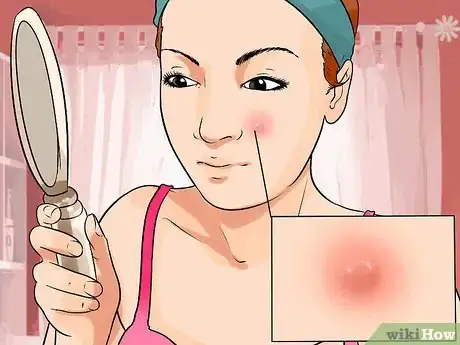
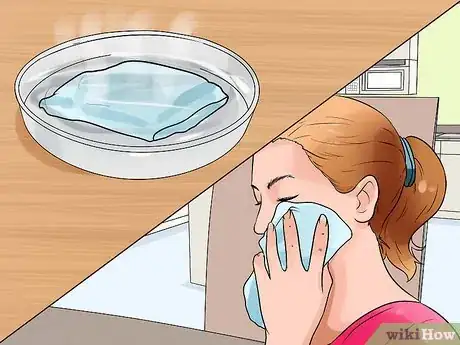

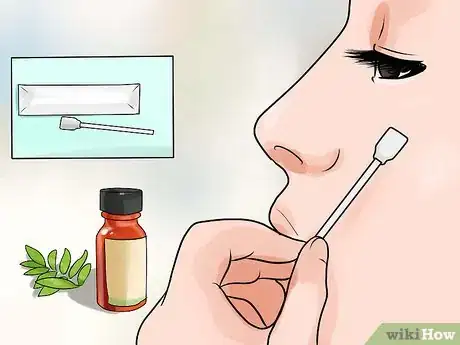
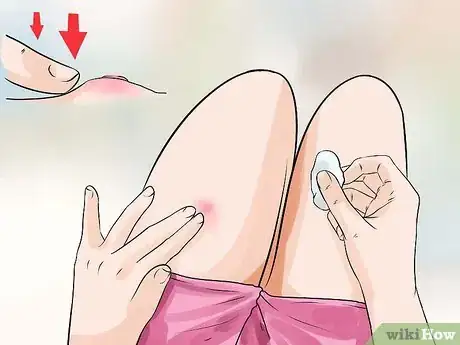
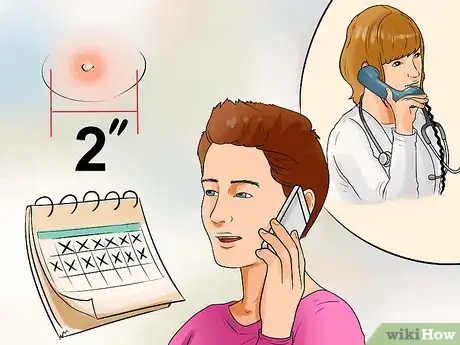
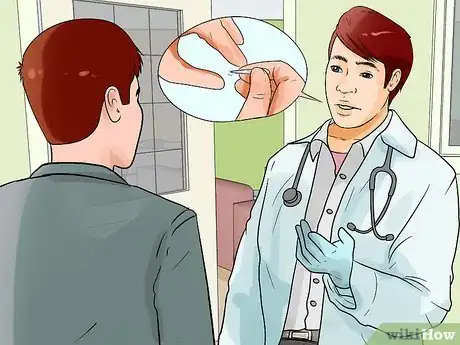
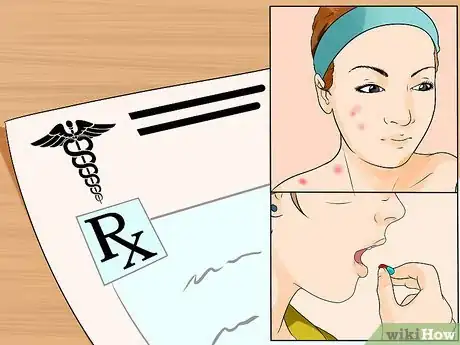
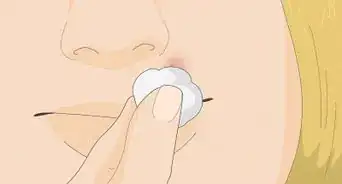
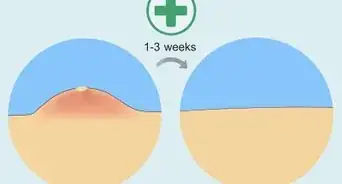

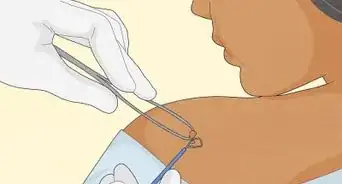
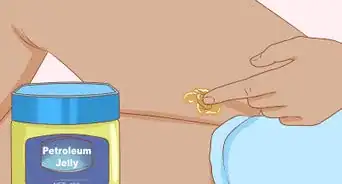
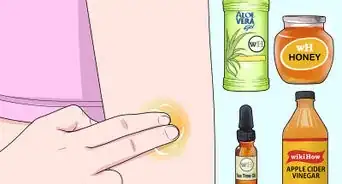
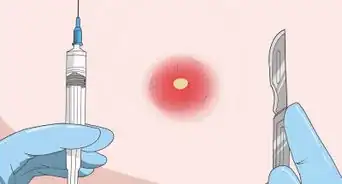
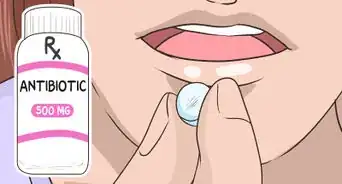
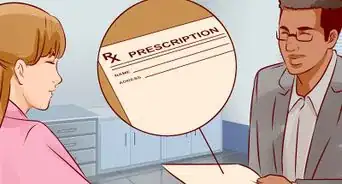

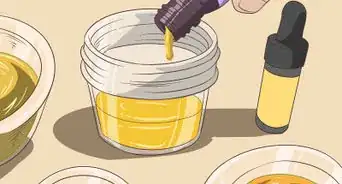
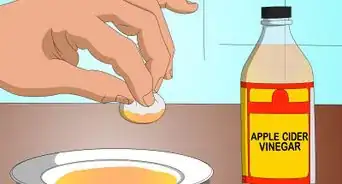

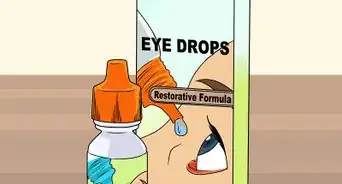









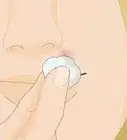
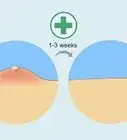

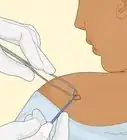



































Medical Disclaimer
The content of this article is not intended to be a substitute for professional medical advice, examination, diagnosis, or treatment. You should always contact your doctor or other qualified healthcare professional before starting, changing, or stopping any kind of health treatment.
Read More...